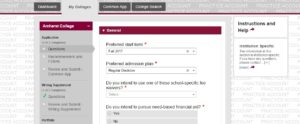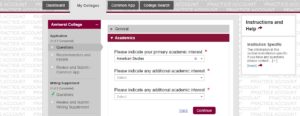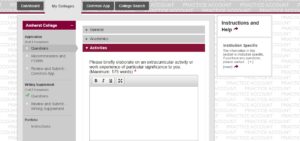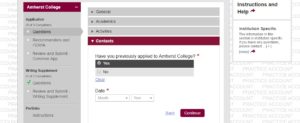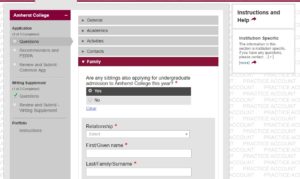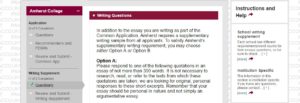The Ultimate Guide to Applying to Amherst
A private liberal arts college in Amherst, Massachusetts, the heart of Pioneer Valley, Amherst College was founded in 1821 as an attempt to relocate Williams College. Today, it forms the “Little Three,” an unofficial athletic conference, with Williams and Wesleyan University, and is known as one of the most prestigious liberal arts colleges in the United States.
Amherst is an exclusively undergraduate college, offering more than 850 courses and 38 majors across arts, science, social sciences, and humanities. It has an open curriculum, meaning there are no distribution requirements, and there is no core curriculum, giving students flexibility and independence. Popular majors include English, Psychology, Political Science, and History. Students also have the option of constructing an interdisciplinary major once they have submitted a formal proposal and obtained faculty approval. Additionally, a small number of students, who must first be nominated by a faculty member, may participate in the Independent Scholar Program, in which they plan a personal program of study under the guidance of a tutor.
Amherst is also a member of the Five Colleges consortium along with the other institutions in Pioneer Valley—Mount Holyoke College, Smith College, Hampshire College, and the University of Massachusetts Amherst. Students may attend classes at these four other schools without paying additional tuition, giving them a catalog of more than 5,300 additional courses.
Another special feature of the Amherst curriculum is the First-Year Seminar, a requirement for all first-year students. The courses are planned and taught by faculty members to introduce to students to liberal studies through innovative, interdisciplinary approaches, encouraging critical thinking and active learning. The classes sizes are small, and students are encouraged to pursue unfamiliar topics and take risks. This year, students may choose from 31 seminars, with topics including Amherst Poets, Language Crossing and Living in Translation, Violence and Politics, Mind and Brain, Telling Stories, Drugs in History, Relativism and Toleration, and many others.
Statistics, Deadlines, and Financial Aid
Amherst is a very competitive school, with an acceptance rate of 13.7% for the class of 2020. For this class, 1,398 applicants were offered a position on the waitlist, and of these candidates, 33 were offered admission.
Amherst offers a binding Early Decision program, meaning students who are accepted under this program are required to matriculate at Amherst. The application deadline is November 15th, and students will be notified of their admission decisions by December 15th. Regular Decision applicants must submit their applications by January 1st, and will be notified of their admission decisions by April 1st.
The comprehensive fee for one year at Amherst (including tuition, room, and board) is $65,330, with an estimated total cost of attendance (including personal expense, books, and travel) of $70,918-$73,368. Amherst is need–blind, meaning that a student’s financial need will have no bearing on their admissions decision. Nearly 60% of Amherst students receive financial aid, and 75% of graduates from the class of 2015 graduated with no student loan debt. You may use the Net Price Calculator to estimate your cost of attending Amherst. Financial aid forms are due November 1st for Early Decision candidates and February 15th for Regular Decision Candidates.
Applying to Amherst
Amherst accepts the Common Application, Coalition Application, or QuestBridge Application, along with the Amherst supplement. The is a $60 application fee. Students must also submit either the SAT or ACT. The writing or essay section is recommended. You are not required to submit SAT subject tests, but may do so if you wish. You should also send two teacher revaluations from teachers in English, Math, Science, Social Studies (or History), or Foreign Language. An academic and mid-year report should be sent by your guidance counselor.
Amherst Supplement
The Amherst supplement has five sections (General, Academics, Activities, Contacts, and Family) and a Writing Supplement.
General
In this section, you will enter your start term of Fall 2017, your preferred admission plan (Early or Regular Decision), whether or not you intend to pursue need-based financial aid, and if you intend to submit an optional art portfolio (see below for more information).
Academics
Here, you will list up to three academic interests. You do not have to list three, but you should include at least one. Keep in mind that you are not declaring a major, but simply giving the admissions committee an idea of your current academic interests.
Activities
Here you will be asked to “briefly elaborate on an extracurricular activity or work experience of particular significance to you.” There is a maximum of 175 words. While you will have the opportunity to enter your full range (up to ten) of extracurricular activities in the Activities section of the Common Application, this is an opportunity for you to highlight an activity that is particularly important or meaningful to you. Since you have limited space, try not to repeat what you wrote about the activity in the description or catalog your title and accomplishments; instead, discuss why it is meaningful for you and why you participated in it.
Contacts
This section asks if you have previously applied to Amherst. If you respond yes, you will be prompted for the month and year you applied.
Family
Here, you will list information about your family members’ relationship to Amherst.
First, you will list any siblings who are also applying for admission at Amherst this year, including their names and relationships to you.
Next, you will indicate if you have any relatives who attended Amherst. If so, you will indicate if they are parents, grandparents, siblings, aunts/uncles, or cousins. You will be prompted for their names, relationships to you, and number of degrees received from Amherst.
Finally, you will list any parents, grandparents, aunts/uncles, or cousins who ever worked for Amherst, including their names, relationships to you, titles, and departments or affiliations. You will also indicate if they are still employed at Amherst.
Writing Supplement
There are two essay options for this supplement.
Option A asks:
Please respond to one of the following quotations in an essay of not more than 300 words. It is not necessary to research, read, or refer to the texts from which these quotations are taken; we are looking for original, personal responses to these short excerpts. Remember that your essay should be personal in nature and not simply an argumentative essay.
- Prompt 1: “Rigorous reasoning is crucial in mathematics, and insight plays an important secondary role these days. In the natural sciences, I would say that the order of these two virtues is reversed. Rigor is, of course, very important. But the most important value is insight—insight into the workings of the world. It may be because there is another guarantor of correctness in the sciences, namely, the empirical evidence from observation and experiments.”
Kannan Jagannathan, Professor of Physics, Amherst College
- Prompt 2: “Translation is the art of bridging cultures. It’s about interpreting the essence of a text, transporting its rhythms and becoming intimate with its meaning… Translation, however, doesn’t only occur across languages: mentally putting any idea into words is an act of translation; so is composing a symphony, doing business in the global market, understanding the roots of terrorism. No citizen, especially today, can exist in isolation—that is, untranslated.”
Ilan Stavans, Professor of Latin American and Latino Culture, Amherst College, Robert Croll ’16 and Cedric Duquene ’15, from “Interpreting Terras Irradient,” Amherst Magazine, Spring 2015. - Prompt 3: “Creating an environment that allows students to build lasting friendships, including those that cut across seemingly entrenched societal and political boundaries… requires candor about the inevitable tensions, as well as about the wonderful opportunities, that diversity and inclusiveness create.”
Carolyn “Biddy” Martin, President of Amherst College, Letter to Amherst College Alumni and Families, December 28, 2015. - Prompt 4: “Difficulty need not foreshadow despair or defeat. Rather achievement can be all the more satisfying because of obstacles surmounted.”
Attributed to William Hastie, Amherst Class of 1925, the first African-American to serve as a judge for the United States Court of Appeals
If you choose to complete Option A, select the quote that speaks to you the most. Think about the ways in which it challenges you to reflect about or consider new perspectives. You don’t necessarily have to agree with it, but it should evoke a personal response. Carefully highlight key ideas, and take notes on your thoughts about it. Remember that you don’t need to research the texts from which the quotes were taken; this is about you and your reaction to the quote.
Option B asks the following:
Please submit a graded paper from your junior or senior year that best represents your writing skills and analytical abilities. We are particularly interested in your ability to construct a tightly reasoned, persuasive argument that calls upon literary, sociological or historical evidence. You should NOT submit a laboratory report, journal entry, creative writing sample or in-class essay.
This option is significantly easier than Option A, since you have already written the paper. However, you should take care to consider which paper best exemplifies your skills as a writer and your ability to create a strong argument using evidence. If you are having trouble deciding which paper to include, you may want to ask a teacher who is familiar with your writing for help selecting a particularly strong one.
If you choose Option B, you may upload a scanned copy of the paper or mail it to Amherst College, Office of Admission, P.O. Box 5000, Amherst, MA 01002-5000. If you mail it, make sure it includes all of your identifying information (full name, date of birth, high school name, high school city, state and country).
Optional Research Questions
If you have undertaken research in the natural sciences, mathematics, computer science, social sciences, or humanities independently of your high school curriculum, you may provide a 50-75-word description of your project. This is entirely optional. If you choose to include a description, you will be asked for your mentor’s name, title, and institutional affiliation, and if your research was submitted to any national competition and/or accepted for professional publication.
Optional Materials
Students with exceptional accomplishments in visual or performing arts may submit materials showcasing their talents through SlideRoom.
Students wishing to participate in varsity athletics should indicate so on the Common Application.
The Amherst application process may seem daunting, but with these tips, you should be well on your way to creating a stellar application. Good luck!
Curious about your chances of acceptance to your dream school? Our free chancing engine takes into account your GPA, test scores, extracurriculars, and other data to predict your odds of acceptance at over 500 colleges across the U.S. We’ll also let you know how you stack up against other applicants and how you can improve your profile. Sign up for your free CollegeVine account today to get started!
